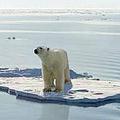 北極圈五個簽署保護北極熊協議的國家,日前通過新決議,將採取更積極的氣候保護行動來確保北極雄的未來存續。
北極圈五個簽署保護北極熊協議的國家,日前通過新決議,將採取更積極的氣候保護行動來確保北極雄的未來存續。
境內有北極熊棲息的國家包括加拿大、丹麥(格林蘭島)、挪威、俄羅斯以及美國,這些國家在1973年正式簽署了具法律約束力的「保護北極熊」協議,並且同意保護白北極熊以及牠們的自然棲地。而這些國家的代表們3月中旬在挪威特羅姆瑟進行為期3天的集會,這是他們從2007年之後所召開的第一次會議。
世界自然基金會(WWF)國際北極專案的北極熊協調專家喬夫約克(Geoff York)表示,「本次會議的最終宣言可以說非常地鼓舞人心。」
他進一步指出,「我們曾經因為有些國家在承擔處理氣候變遷的責任落後其他國家而感到憂心;但最後這些國家都認清到氣候變遷是對於北極熊未來福祉的最主要威脅。」
他們也正式承認,我們迫切需要一個有效率的全球回應,讓我們能共同面對氣候變遷所帶來的挑戰,例如《聯合國氣候變化綱要公約》(UN Framework Convention on Climate Change, UNFCCC)12月將在哥本哈根舉行會議,而且預計要完成京都議定書的後續協議。」
挪威環境及國際發展部長蘇爾漢(Erik Solheim)也表示,「北極地區的急速暖化以及海冰減少的幅度都是北極熊的最大威脅。」
他說,「氣候變遷同時也讓北極熊更容易受到其他威脅的影響,如有毒化學品的使用、狩獵活動以及對於牠們自然棲地的破壞和侵害等。」
 蘇爾漢說,「很多北極熊族群是各國邊境共享的,而且北極熊也會在各國邊境上進行遷徙,這表示無論在哪一個地區所採取的行動都會影響其他國家北極熊的發展。而且北極地區的氣候變遷問題以及越來越多的工業活動,都迫使我們更需要加強國際合作共同對北極熊進行有效管理。」
蘇爾漢說,「很多北極熊族群是各國邊境共享的,而且北極熊也會在各國邊境上進行遷徙,這表示無論在哪一個地區所採取的行動都會影響其他國家北極熊的發展。而且北極地區的氣候變遷問題以及越來越多的工業活動,都迫使我們更需要加強國際合作共同對北極熊進行有效管理。」
而約克也表示,「挪威政府在連結各國政府,以及協助會議建立一個高度期待當中扮演關鍵角色。」蘇爾漢向挪威電視台表示,「如果我們沒有拯救北極熊,對於後代子孫而言將會是極大的傷害。」
本週在為期3天的會議當中,境內有北極熊分佈的國家同意提出一項《北極圈行動計畫》以對北極熊進行有效管理,並且正式指派「國際自然及自然資源保護聯盟」(International Union for the Conservation of Nature, IUCN)的「北極熊專家小組」作為協議的科學諮詢機構。
Five nations obliged by treaty to conserve polar bears have resolved to link the future of the species to urgent global action on climate change.
The polar bear range states - Canada, Denmark/Greenland, Norway, Russia and the United States - in 1973 signed the legally binding Agreement on the Conservation of Polar Bears, agreeing to protect the white bears and their habitat. They gathered in Tromso for three days this week, their first meeting since 2007.
"We are very encouraged by the final declaration from this meeting," says Geoff York, polar bear coordinator for WWF International Arctic Program.
"We were concerned that some countries were lagging behind the others in their commitment to dealing with climate change, but ultimately, the parties recognized climate change as the primary threat to the future well-being of polar bears," said York.
"They also recognized formally "the urgent need for an effective global response that will address the challenges of climate change,?to be addressed at gatherings such as the meeting of the UN Framework Convention on Climate Change in December in Copenhagen where a successor agreement to the Kyoto Protocol is expected to be finalized.
Erik Solheim, Norwegian minister of the environment and international development, said the rapid warming of the Arctic and the reduction in the extent of sea ice is a serious threat to polar bears.
"Climate change also makes the polar bear more vulnerable to other threats such as hazardous chemicals, hunting, disturbances and encroachment upon their natural habitat," he said.
"Many polar bear populations are shared between neighboring countries, and polar bears migrate across national borders. This means that activities in one area may affect polar bears in other countries. Climate change and increased industrial activity in many parts of the Arctic therefore requires reinforced international cooperation on the management of polar bears, Solheim said.
The Norwegian government played a key role in bringing the parties together, and in setting high expectations for the meeting, York said.
Solheim told Norwegian television, "It would be an amazing crime against future generations if we did not save the polar bear."
At this week's three day meeting the polar bear range states also agreed to come up with a circumpolar action plan for the management of bears, and to formally designate the Polar Bear Specialist Group of the International Union for the Conservation of Nature, IUCN, as the scientific advisory body to the Agreement.




